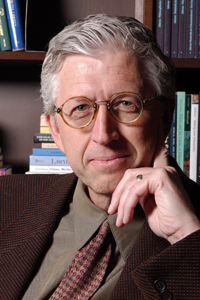Pippin, a leader in interdisciplinary work, elected to oldest learned society
By Josh Schonwaldjschonwa@uchicago.edu
News Office
 Robert Pippin |
|
Robert Pippin, the Evelyn Stefansson Nef Distinguished Service Professor in Social Thought, Philosophy and the College, has been elected a member of the American Philosophical Society.
Founded by Benjamin Franklin in 1743, the Philadelphia-based organization is the nation’s oldest learned society.
Though the American Philosophical Society has nearly 1,000 members, including 99 Nobel laureates, only 14 philosophers are among this esteemed group.
“It’s an overwhelming and humbling honor to have been elected to such an historically important society,” said Pippin. “I am eager to begin contributing to their many important activities.”
Pippin, a professor at the University since 1992, is widely regarded as one of the preeminent interpreters of the modern philosophical tradition, and is especially well known for his interdisciplinary work.
Best known for his work on modern German philosophy—reflected in such books as Hegel’s Idealism, Henry James and Modern Moral Life, and his newest book, Hegel’s Practical Philosophy—much of Pippin’s work seeks to understand modernity and the effects of modernization on cultural and ethical life.
In addition to Pippin’s work in modern German philosophy, his broad interests include contemporary continental philosophy, moral theory, and social and political philosophy. He also has a number of interdisciplinary interests that involve philosophical issues in literature, art history and film.
The author of numerous books and articles in English and German, Pippin received the 2001 Distinguished Achievement Award from the Andrew W. Mellon Foundation.
Pippin, who also is a fellow of the American Academy of Arts and Sciences, the other American honorary society, was among 35 people elected to become members of the APS during its spring meeting.
The society, whose early members include George Washington, John Adams, Thomas Jefferson and Thomas Paine, promotes “excellence and useful knowledge in the sciences and the humanities through scholarly research, professional meetings, publications, library resources and community outreach.
![[Chronicle]](/images/sidebar_header_oct06.gif)